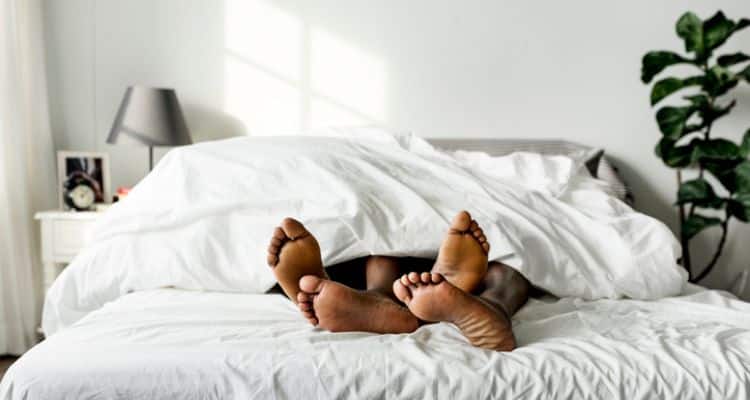Have you ever wondered if you can catch HPV from bed sheets, a virus that can cause problems like warts and cancer? The answer is no. You cannot get HPV from bed sheets.
HPV spreads through skin contact, such as during sexual activity. So, while it’s important to wash your sheets regularly to keep them clean and fresh, you don’t need to worry about getting HPV from them.
Let’s find out more about HPV.
How HPV Can Be Spread Through Contaminated Surfaces?
HPV, a virus that can cause problems like warts and cancer, usually spreads through skin-to-skin contact. However, HPV can be spread through contaminated surfaces.

For example, if someone with HPV touches a surface like an elevator rail, and you touches that same surface, you can get the infection.
That’s why keeping surfaces clean and practicing good hygiene, such as washing your hands regularly, is important. Remember, the best way to protect yourself from HPV is to get vaccinated, practice safe sex, and get regular check-ups with your doctor.
The Dangers of Contracting HPV
HPV is a virus that spreads through sexual contact or skin-to-skin contact. It can cause a variety of health problems. Certain types of HPV can cause warts, while others can cause serious problems like cervical or throat cancer.
These cancers require extensive treatment, and HPV can have negative emotional and social consequences, including stigma and anxiety.
To prevent HPV, it is crucial to take preventative measures such as vaccination, practicing safe sex, and getting regular check-ups with your doctor. These steps can help reduce the risk of HPV-related health problems and promote overall health and well-being.
Can You Get HPV From Bed Sheets?
Many people wonder if they can catch HPV from bed sheets, but the answer is no. In most cases, HPV can spread through skin contact, especially during sexual activity.
It does not spread through contact with objects like bed sheets. However, it’s still important to keep your sheets clean and fresh by washing them regularly.
How to Prevent HPV Infection from Bed Sheets?
While HPV does not typically spread through bed sheets, practicing good hygiene to prevent viruses and bacteria is still essential.
To keep your sheets clean and fresh, washing them regularly with warm water and detergent is a good idea. You should avoid sharing towels or other personal items with others, as this can increase the risk of infection.
To keep yourself safe from HPV, you need to get vaccinated. Moreover, it is better to practice safe sex and to keep things on track. You must get regular medical check-ups.
Protecting Yourself
Human papillomavirus (HPV) is a common sexually transmitted infection that can cause various health problems, including genital warts and certain types of cancer.
Fortunately, there are steps you can take to protect yourself from HPV. You can get vaccinated before jumping into any sexually activity.
Other ways to reduce your risk of contracting HPV include using condoms during sex, limiting your sexual partners, and getting regular Pap and HPV tests if you are a woman.
How Long is HPV Contagious on Surfaces?
The risk of HPV transmission from surfaces is generally low. HPV is a virus that primarily spreads during sexual activity. While HPV can survive outside the body briefly, the virus is usually not contagious on surfaces.
However, it is crucial to practice good hygiene to prevent other infections. Regular hand washing with soap and water will reduce the risk of infections. If you have concerns about HPV transmission, talk to your healthcare provider.
Conclusion:
There is no evidence to suggest that HPV can transmit through bed sheets or other forms of indirect contact. HPV primarily transmits through skin contact during sexual activity.
However, it is essential to practice good hygiene and safe sex to reduce the risk of transmitting HPV and other sexual infections.
This includes using condoms during sexual activity, getting regular HPV vaccinations, and screening for HPV and other STIs, as healthcare professionals suggest.
While understanding the facts and taking preventative measures can help to reduce the risk of infection.
Can You Get HPV From Bed Sheets FAQs
Can HPV Live On Toilet Seats?
While it is theoretically possible for HPV to survive on toilet seats or other surfaces, the risk of transmission through this route is low. HPV is primarily spread through skin contact during sexual activity with an infected partner.
When Does HPV Become Not Contagious?
HPV becomes not contagious once the immune system clears the virus from the body. This typically happens within a few months to a few years after infection. However, some people may remain contagious for longer. It is possible to get the infection again with HPV even after clearing the virus.
How Do You Get Rid of HPV on Surfaces?
HPV is not typically contagious on surfaces, but good hygiene prevents other infections. Regular cleaning can help reduce the transmission risk, as can avoiding sharing personal items like towels or razors.
How Long Does HPV Last in the Air?
HPV is not an airborne virus and does not typically survive in the air for long. The virus primarily spreads through skin contact during sexual activity. However, take precautions to prevent the spread of HPV and other infections.

